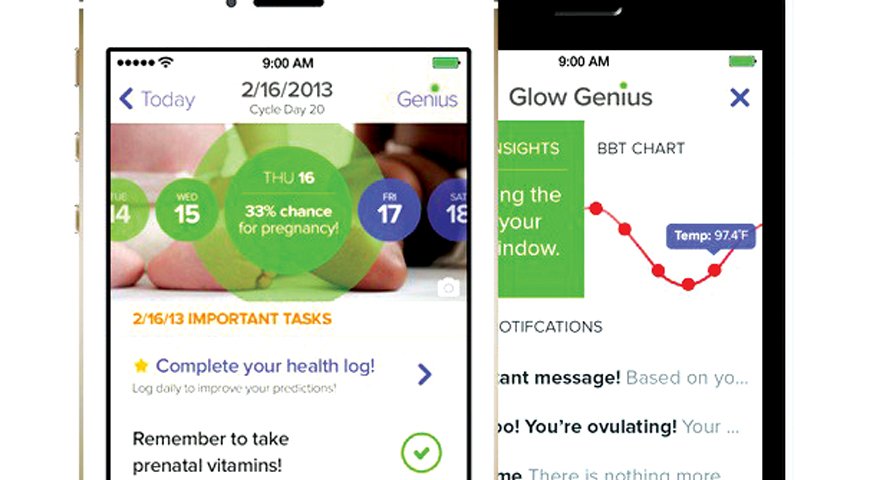In May 2013, PayPal cofounder Max Levchin and former Google exec Mike Huang launched Glow, an app that uses data to help couples conceive. Now, with Glow for Enterprise, the two are bringing the app from the bedroom to the boardroom.
Q: WHAT IS GLOW?
Mike: Glow is an app that uses data input by users to solve the problem of infertility. There are tons of fertility apps that tell you a standard time to have sex—period trackers—but we take into account emotional and physical information and try to correlate it with potential causes of infertility.
Max: And Glow offers an avenue to access any needed treatments through the Glow First program, which we categorize as crowdfunding for babies.

CROWDFUNDING FOR BABIES?
Mike: Yes. Participants in Glow First contribute $50 a month for up to 10 months, the average time it takes a woman to conceive. After the 10 months, the contribution pool is equally divided amongst any participants who were unsuccessful with a natural pregnancy, to offset the high cost of fertility treatments.
NEITHER OF YOU HAS A MEDICAL BACKGROUND—WHAT INSPIRED YOU TO LAUNCH A FERTILITY APP?
Max: I believe that most of the problems in the world can be solved if you apply data to them. We wanted to solve a prevalent problem and felt that healthcare—particularly fertility—was acutely underserved.
Mike: My wife and I have gone through [fertility issues] ourselves. So I had a personal motivation to help other couples.
WHY DID YOU THINK AN ENTERPRISE VERSION OF GLOW MADE SENSE?
Mike: There are only 15 states that require employers to have any kind of fertility coverage at all, and few mandate any form of IVF coverage. So employees are very vulnerable.
HOW DOES GLOW FOR ENTERPRISE WORK?
Mike: On the employee side, the experience is the same in Enterprise as it is for the regular consumer. We simply ask that the employees enter their work email or scan a pay stub to identify that they truly work for that company. But we take data privacy very, very seriously—the employer will not know who has downloaded Glow. The employer pays the $50 per employee, per month, for Glow First. We send the employers an aggregate view of how many of their employees have enrolled in these programs, but they won’t know the names.

WHY WOULD AN EMPLOYER WANT TO HELP ITS EMPLOYEES GET PREGNANT?
Max: Companies are looking to offer competitive benefits to attract top-tier talent.
Mike: This is a great retention tool for employers.
DOES FACILITATING PREGNANCIES COST BUSINESSES MORE THAN NOT DOING SO?
Mike: I would argue that it won’t. If you start receiving IVF, your chance for multiple births is higher and that becomes a high-risk pregnancy, which drives up the costs. If, over time, we can achieve more natural pregnancies and fewer of these more complicated pregnancies, you can lower the cost.
Max: It also encourages employees to be proactive about their health and acts as a preventative tool, which can help to minimize downstream healthcare costs.
WHAT COMPANIES HAVE SIGNED ON FOR GLOW FOR ENTERPRISE?
Max: We are in the early stages. Right now, Eventbrite, Evernote and Domo are rolling this out.
ALL THREE ARE TECH STARTUPS, WHICH MAY BE MORE CULTURALLY OPEN TO GLOW. WILL OTHER INDUSTRIES FEEL THE SAME WAY?
Max: We hope to be partnered with any business that is looking to offer progressive benefits to its employees.
WHAT’S YOUR LONG-TERM PROGNOSIS?
Mike: Our ultimate vision is to lower the cost of healthcare.
For more information, contact Mike Huang, [email protected], glowing.com.






